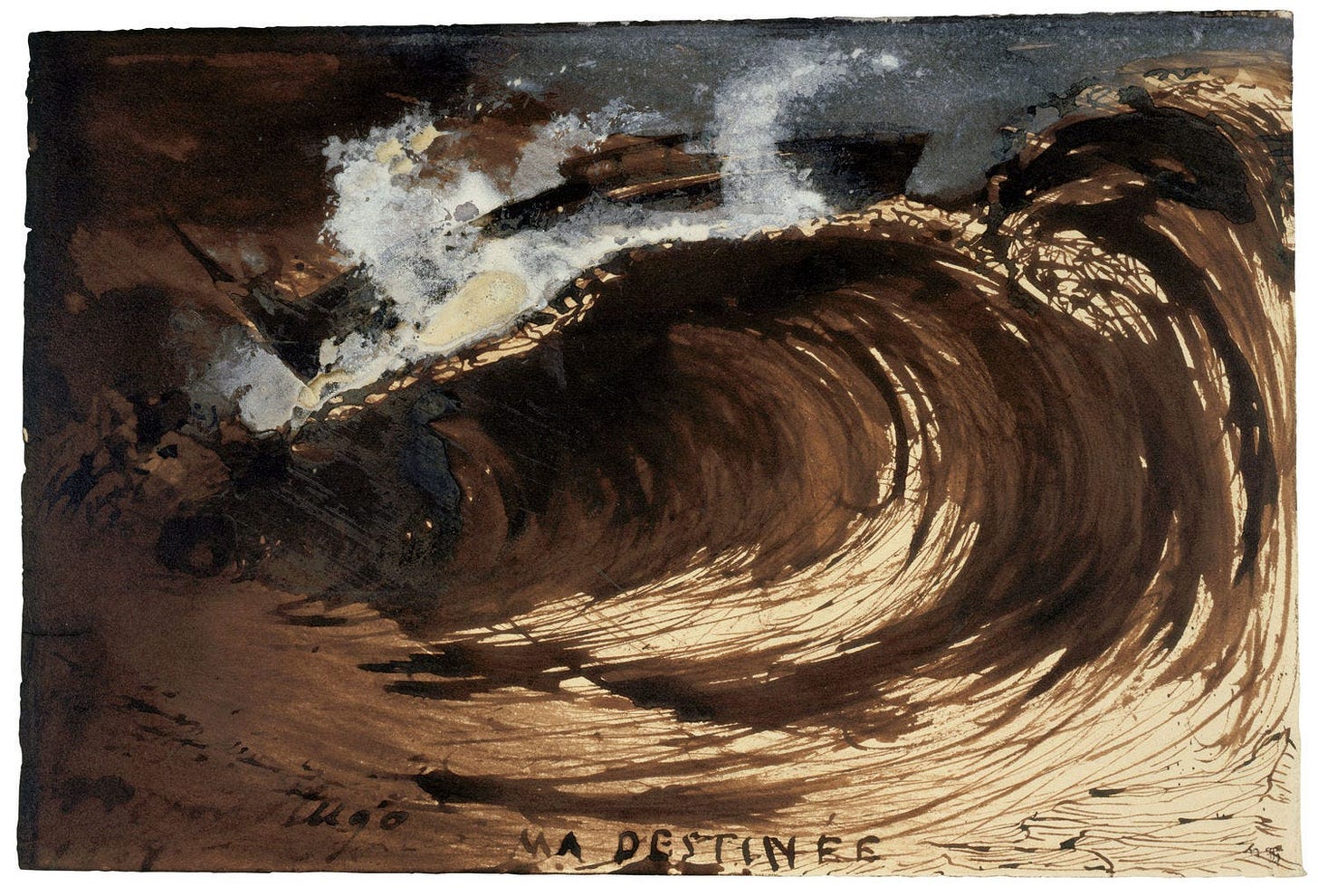
... You shall leave everything you love most:
this is the arrow that the bow of exile
shoots first. You are to know the bitter taste
of others’ bread, how salty it is, and know
how hard a path it is for one who goes
ascending and descending others’ stairs …’
~ Dante Alighieri, Florentine poet.
Every great poet tasted the bitter fruit of being in exile. Ovid, Dante, Byron, Wilde — these great connoisseurs of the human heart were rejected by the capricious narrow-mindedness of the crowd and were forced out of their homes. But their exile was always accompanied with a dream — a dream of the glorious and powerful return. This is, of course, a paradox: they looked forward by always looking back to what they have lost.
Perhaps, their exile acted as an ‘invisible tax’ which they had to pay to unlock the labyrinths of their unconscious.
I believe the exile had a profound effect on their psyche, moreover, I believe that Dante could not have written Divine Comedy if not in exile; Byron could not have written Don Juan or Manfred if not in exile; and Oscar Wilde, of course, would not have written De Profundis and The Ballad of Reading Gaol if not in exile.
But the man who truly unlocked the labyrinths of his unconscious was Victor Hugo. We know him by his brilliant novels as ‘The Hunchback of Notre-Dame’. Hugo, however, was not only a poet and a novelist, but also an ardent political activist.
After all, he was French who was born at the ‘age of revolution’ — as historians later labeled it. It was the age of romantics and of dreamers who believed that the utopian society is possible if people have enough desire to fight for it. Victor Hugo was not just a mere soldier of these beliefs, but one of their great leaders.
After being elected to the French Parliament in 1848, during the reign of Louis-Philippe, Victor Hugo used his position to advocate for causes such as the abolition of the death penalty, freedom of the press, universal suffrage and free-education.
But politics was always the art of seeking a trouble. When Louis-Philippe was overthrown and replaced by a more tyrannical Napoleon III, Victor Hugo had to leave Paris and spend his exile on the small English island of Guernsey near the French coast.
The escape from the noisy, callous and landlocked Paris of his time gave him a chance to unchain the power of his unconscious. Every evening he sat on the top floor of his house, where his desk overlooked the waters of the sea. There the greatest novelist and poet of the 19th century began to draw.
The Dark Shadows of Subconscious
‘In all chaos there is a cosmos, in all disorder a secret order’ ~ Carl Jung
In mythologies of the ancient cultures, the sea acted as a symbol of hidden depths of our psyche. The creatures that lived beneath its surface represented the various hidden impulses of our soul. Whilst sitting behind his desk and witnessing the sea waves crash on the shore, Victor Hugo’s unconscious drew this dark ominous image of the octopus.

What makes this and thousands of his drawings particularly mysterious is the odd and strange way Victor Hugo drew them. We know him as fine engineer and as a grand architect of stories that span thousands of pages with intertwined storylines, but his drawings were product of a vision, of an impulse, of spontaneity.
He drew with blood, with coal dust or with coffee beans. He drew them with his eyes closed or using his left hand to unchain his subconscious impulses.
This adds a subtle symbolism to Hugo’s drawing of Octopus, since in ancient Scandinavian folklore it symbolised creativity, diversity, intelligence and unpredictability — everything that Hugo was pursuing by his drawing.
Justice
‘To love another person is to see the face of God’ ~ Victor Hugo, Les Misérables.
In 1853, the brutal murder of a woman by her husband shocked the small island of Guernsey. This was not crowded Paris where people felt distant from each other. This was an island of a few thousand inhabitants, where everyone knew each other, where every event felt tangible, where each tragedy touched every family.
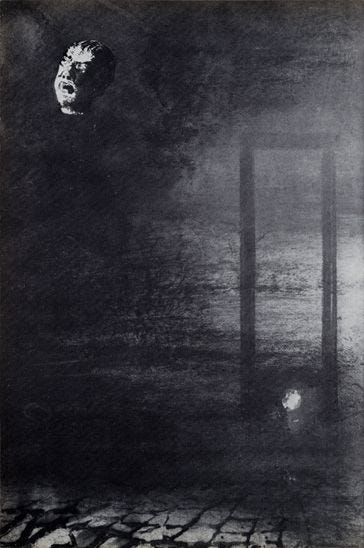
The evidence against Charles Tapner, the man who was accused of murdering his wife, was substantial but not definite. The residents did not see any certain motivation in Tapner’s cruel action. Despite of numerous petitions signed by the residents pushing the British Home Secretary to acquit Tapner, he was still sentenced to death by hanging.
One of the signatories of that petition was Victor Hugo. He stood by his principles that nobody has the right of taking someone else’s life. After all, it was for defending those exact principles, that he was forced into the exile.
Hugo sank into a deep melancholy. He sat at his desk and drew one of the darkest and scariest drawings I have ever seen. He called it ‘Justicia’.
This drawing was made two decades before the art critic Louis Leroy used the term ‘impressionism’ to describe the artistic style of painters like Monet. But, we don’t have to be art-critics ourselves, to ask ‘what is Justicia drawing if not a product of an impression? An impression of Tapner’s soul surrounded by darkness and his floating head screaming from pain. If we step back and look from a distance we can also see a blurry face of a woman, of his wife.
Les Misérables.
“Even the darkest night will end and the sun will rise.”
― Victor Hugo, Les Misérables
Those who are forced to be in exile never know if they are ever going to return home. From the very first days they try to create a space where everything looks and feels, tastes and smells like home.
The interior of the house, where Victor Hugo settled in, during his time in exile is a piece of art itself. He designed it entirely by his own hand. Each room in the Hauteville House reflected a historical period of France.
If every other room in the house was dedicated to the past, the room on the top floor was dedicated to the present.The room overlooked the sea, and it was there where Hugo began to write his masterpiece Les Misérables.
‘Those who do not weep, do not see’ says one of my favourite lines from that novel. If you see sufferings of others and their pain doesn’t put tears on your cheeks, then you did not fully grasp their pain.
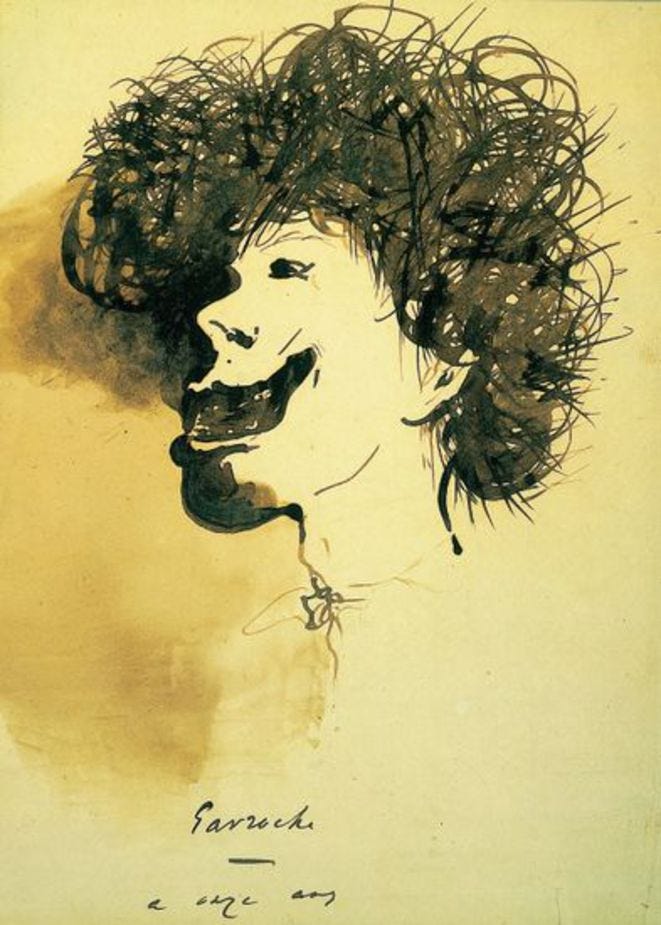
Drawing, once again, acted as a back-door to unconscious for Hugo.
We can see that in his drawing of Gavroche — one of the most iconic characters of Les Misérables.
He is the boy lives on the streets. His character represents what is it like to be someone who was born without the right for a decent future.
But Gavroche has a darker symbolism — he symbolises populism. The rule, the impulse, the irrational instinct of the crowd.
The drawing of him is as ominous and dark as Hugo’s drawing of Tapner.
Gavroche’s wide, dark smile and his narrow eyes remind me of another more recent fictional character who is also a populist, disenfranchised madman— the Joker played by Joaquin Phoenix in 2019 adaptation by Todd Philips.
Order & Chaos.
‘One must have chaos in oneself to give birth to a dancing star.’ ~ Friedrich Nietzsche
Victor Hugo kept his drawings private and rarely shared with anyone outside his narrow circle. Although, one the greatest painters of the time Eugène Delacroix said that if Victor Hugo had decided to become a painter instead of a writer, he would have become one the greatest artists of the century.
Why did he keep his drawings secret? Literary critics explain this as his desire to focus the attention of the public on his novels. They might be right, but there can be another reason.
Hugo’s heart was a battleground between chaos and order. Throughout his hard life, he tried to tame the surrounding chaos to give birth to exceptional works. He drew his destiny as a strong, uncontrollable ocean wave, of which he tried to get hold of.
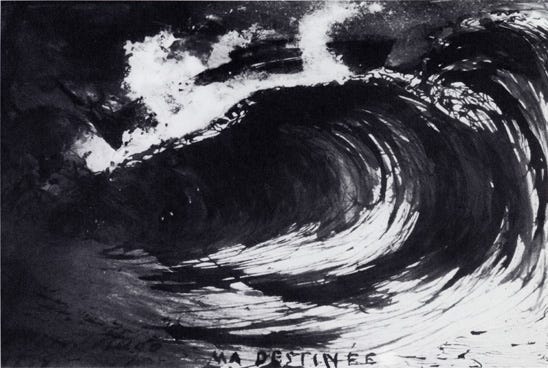
He felt, as if, the destiny tried to take away everything that he had loved. His eldest and favourite daughter Léopoldine drowned in a boating accident in 1847. Then the destiny forced him out from home.
Drawing acted as a therapy. Through drawing he could make those forces of chaos more tangible. He could get into a dialogue with them.
Dante, Byron and Wilde did not dare explore other art forms to unlock their unconscious. That is what makes Victor Hugo and his writing exceptional. That is what makes Les Misérables so sublime. That novel is a drawing painted with words.
This article was originally published in September, 2022 on Medium.
I no longer write there, so thought I would share some of the pieces here.
Do you want to keep a journal? (Patreon)
I’ve been journaling for the past 15 years of my life. By saying this I mean that for the past decade and a half, I’ve been sitting down, consistently, every day, and writing my thoughts and ideas into my notebook.
If you would like to begin your journaling journey, but don’t know where to start, how to stay consistent, or which type of journaling suits you, consider subscribing to my Patreon page.
I’ve made several ‘Guided journaling’ videos, where we sit down and journal together, I give journaling tips based on science, and I share some very personal pieces of advice based on my own journey.




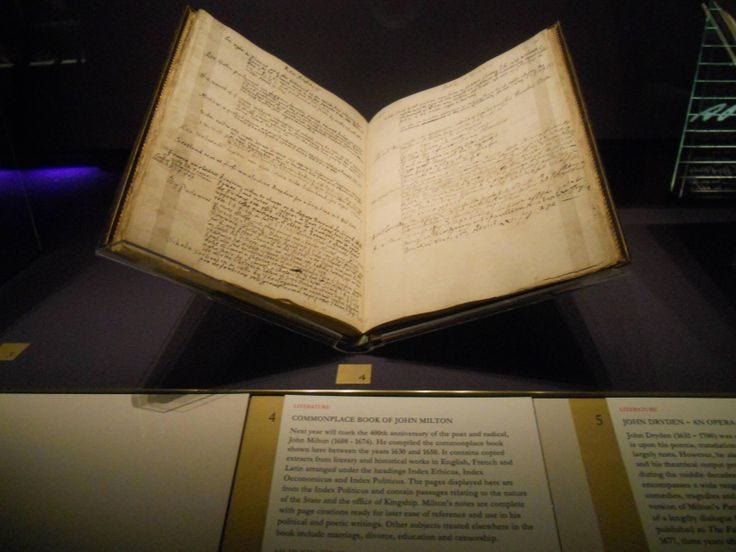
Absolutely, he's so powerful! Have you ever presented any of Nikos Kazantzakis' books? He is another powerful writer.
As always, exceptional!, Thanks much, Vashik!!!